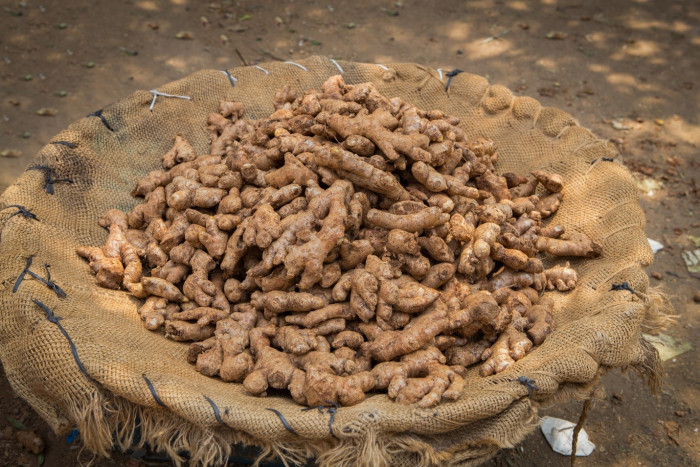
Ginger is an important commercial crop that is gaining popularity worldwide with Nigeria having abundant potential to produce for domestic consumption and export markets. Nigerian ginger production is primarily driven by the export market with more then 90% of the annual production being exported with very little added value. Nigeria is among the major global producers and suppliers of both fresh and dried split ginger, accounting for 9.6% of total world ginger exports. It is the third largest exporter after China and India.
In the course of the Ginger value chain analysis, our project (1) identified key challenges that include declining ginger yields, ginger quality and safety. At production level, the low yield of ginger is attributable to several factors such as bad agronomic practices, declining soil fertility and use of unimproved varieties. The market of Nigerian ginger is also negatively affected by mold infections and aflatoxin contamination, subsequently raising concerns about the ginger quality and safety. Issues resulting from aflatoxin contamination present a serious obstacle to improving the competitiveness at markets and linking ginger farmers to lucrative markets.
Corresponding to the key challenges identified, AFC’s project interventions in the ginger value chain are the following:
- Reduction of Aflatoxin contamination: aflatoxin occurrence and distribution along the ginger value chain was mapped to identify the cultural practices that predispose the crop to fungal infection and subsequent aflatoxin contamination. Results suggest that an increased level of awareness and understanding among the value chain actors with regards to the benefits of Good Agricultural Practices (GAP), Good Handling Practices (GHP) might contribute to significant reduction in aflatoxin contamination. Currently a first sensitisation campaigned with value chain actors is rolled out in the ginger growing region.
- Introduction of Good Agricultural Practices and improved post-harvest handling: The training format Farmer Business School (FBS) and corresponding training materials are adapted to the specific needs of ginger producers in Nigeria. Trainings are delivered to selected Lead Farmers who are then responsible to further stepping down their knowledge to neighbour farmers. Training modules also include Integrated Soil Fertility Management (ISFM) to increase organic material in fields being used to grow ginger. Theoretic trainings are support by trainings on established demonstration fields.
- Market Study and establishment of linkages to business partners: A market study is been undertaken to establish an overview about the regional and international buyers and their purchase priorities. The project will then proactively support its local partners in achieving the quality requirements and in the establishment of new trade relationships. At the same time, ginger producers and processors are exposed to certification schemes such as ECOCERT, Global GAP, Fairtrade and other.
For further information please contact Sophia Baumert (sophia.baumert [at] afci.de)
(1) NICOP (Nigerian Competitiveness Project) is an EU-GIZ co-funded project. The value chain component is implemented by AFC from 2019 till 2022.
